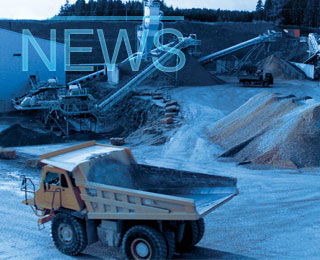PPC reported that group revenues for the year ending March 2017 rose by five per cent to ZAR9641m (US$750m). The growth was supported by the rest of Africa cement business where revenues rose by nine per cent, and the aggregates and ready-mix segment which saw revenues increase by 23 per cent.
Group EBITDA decreased by 13 per cent to ZAR2065m while the EBITDA margin achieved was 21.4 per cent (March 2016: 26 per cent). The decline was mainly attributable to the southern Africa cement segment where EBITDA was 19 per cent lower relative to the previous year. EBITDA margins in
this segment declined from 26.9 per cent to 21.,6 per cent. This was countered by the rest of Africa cement segment which saw a 19 per cent rise in EBITDA, and corresponding margins improving from 27.7 per cent to 30.5 per cent with Rwanda the major contributor to the increase. Lower EBITDA was also realised in the lime and aggregates and ready-mix segments.
Net profit attributable to PPC shareholders declined by 88 per cent to ZAR93m (March 2016: ZAR793m). On a normalised basis net profit declined from ZAR655m to ZAR512m for the year. In line withthis, earnings per share were 93 per cent lower at eight cents (March 2016: 117 cents) and headline earnings per share fell 93 per cent to seven cents (March 2016: 107 cents).
Revenue in southern Africa was flat, with cement volumes increasing by two per cent, offset by lower selling prices. In particular, PPC noted that the competitive landscape in Gauteng intensified, forcing cement prices down notably in the bulk market. Gauteng volumes were also negatively impacted by excessive rainfall in the first two months of 2017. Inland sales (excluding Gauteng) volumes
rallied well across all segments in a tough market to end flat for the year. All sectors in the coastal region again performed well, with double-digit volume increases for the year.
The Botswana operations, recorded flat volumes while selling prices were down nine per cent due to increased competition from imports from South Africa. Market leadership was maintained by focussing on brand, operational efficiencies and cost competitiveness. However, EBITDA dropped significantly in the reporting year.
Rest of Africa cement contributed ZAR645m to EBITDA, however it has not contributed to profit after
tax. This is attributable to operational ramp-up,depreciation and tax charges.
Zimbabwe operations, recorded volume declines of three per cent while selling prices, in US dollar terms, declined 10 per cent. The rand appreciated by nine per cent against the US dollar during the year, which also impacted profitability. Importation of cement declined slightly compared to the previous year mainly due to the introduction of cement import tariffs of US$100/t, effective 1 October 2016. PPC noted that the liquidity challenges in the domestic market continue to be of concern and management is working to diversify revenue streams, increase localised procurement and grow export volumes. The new Harare mill is expected to reduce outbound logistics costs while increasing accessibility to the northern markets.
Cimerwa in Rwanda sold 310,000t of cement in the year under review, increasing its contribution to group sales. Cimerwa’s priority is to grow volumes so that it can increase its plant capacity utilisation and continues to focus on venturing into new markets and finding new distribution channels.
Construction of PPC's plant in the Democratic Republic of the Congo was completed on schedule, but hot commissioning was postponed until February 2017 due to the delay in the construction and commissioning of the overhead transmission line to supply power to the cement plant. The first cement and clinker was produced in March 2017 during the hot commissioning process while the plant went into production and first sales commenced in April 2017. PPC cautioned that the trading environment in the DRC continues to be challenging, due to surplus capacity coupled with lower pricing levels due to low-cost imports from neighbouring Angola. The local cement producers’ association continues to engage with government on local industry protection as it moves towards self-sufficiency.
In Ethiopia the 1.4Mta Habesha cement plant was delivered in early February 2017 when the bulk power supply to the plant was completed. Inaugurated by the country's Prime Minister in April 2017, the first saleable cement was noted the following month. Cement demand in Ethiopia matches supply and with imports into the country banned, this is expected to remain unchanged in the short term, PPC explained.
Overall group cement capacity increased by 33 per cent from 8.6Mta to 11.4Mta with the commissioning of the Harare plant in the year, and the Ethiopian and DRC cement plants delivered shortly after year-end.
